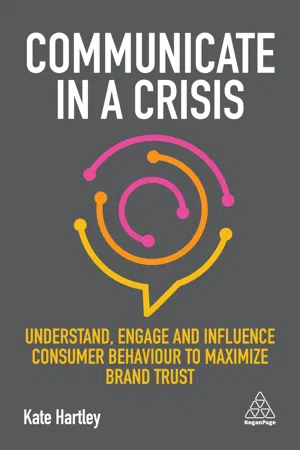
Communicate in a Crisis
Understand, Engage and Influence Consumer Behaviour to Maximize Brand Trust
- English
- ePUB (mobile friendly)
- Available on iOS & Android
Communicate in a Crisis
Understand, Engage and Influence Consumer Behaviour to Maximize Brand Trust
About this book
Communicate in a Crisis is the definitive guide for any PR or marketing professional to recognize, plan and respond to a sudden wildfire of consumer-led reaction, 'manipulated outrage' sparked from interaction on news feed algorithms, fuelled by social media and the constant demand for an instantaneous response.
This book turns the traditional crisis management approach on its head, starting by understanding changing consumer behaviours and the new 'threat' for brands, then outlining practical steps to prepare, synchronize and execute a coordinated brand response across all channels - under pressure. It reveals why we love to hate our favourite brands, how to recognize a day to day problem from a crisis, and offers valuable advice, such as using influencers and brand advocates to address social media trolls, rumours and the impact of fake news. With unique case studies, interviews and anecdotes from global leaders, Communicate in a Crisis will embed a bottom-up culture of long-term reputation management, always ready to face the unexpected.
Frequently asked questions
- Essential is ideal for learners and professionals who enjoy exploring a wide range of subjects. Access the Essential Library with 800,000+ trusted titles and best-sellers across business, personal growth, and the humanities. Includes unlimited reading time and Standard Read Aloud voice.
- Complete: Perfect for advanced learners and researchers needing full, unrestricted access. Unlock 1.4M+ books across hundreds of subjects, including academic and specialized titles. The Complete Plan also includes advanced features like Premium Read Aloud and Research Assistant.
Please note we cannot support devices running on iOS 13 and Android 7 or earlier. Learn more about using the app.
Information
Understanding how consumer behaviour has changed
Introduction
Kick a brand when it’s down
Passion brands and betrayal
Emotional ownership
Table of contents
- Figures and tables
- Foreword
- Part One Understanding how consumer behaviour has changed
- Introduction
- 01Kick a brand when it’s down: Why we love to hate our favourite brands
- 02The issue of declining trust in the spread of fake news
- 03Who do I trust? The rise of individual influencers versus declining traditional media
- 04It’s outrageous! Understanding the new response to outrage and bad news, and the role of social media
- 05I want it now: Managing consumer expectation for instant information
- 06Profile of a troll: Understanding and dealing with trolling behaviour
- 07The conscious consumer: The question complex and pressures of brand transparency
- Part Two The role of changing consumer behaviour in crisis management and response
- 08The new challenges: Understanding the impact of changing consumer behaviour on crisis management strategies
- 09What is acceptable in a crisis? How to differentiate business as usual versus crisis management
- 10The social media Hydra: Principles of transparency versus suppression of information in crisis mitigation
- 11Crises in action: Lessons learned from crisis responses from five major brands
- 12The importance of telling the truth and its role in crisis and reputation management
- 13Withstanding the attack: The importance of resilience in your communications teams
- Part Three Building your crisis communication strategy and response
- 14The brain’s response to a crisis and training your team to cope
- 15Insights from crisis communication influencers on managing the threats facing brands
- 16The role of leadership in a crisis and preparing your crisis team
- 17Showing humanity and empathy in a crisis: When it counts and when it’s empty
- 18What do I do first? Getting your priorities right in a crisis
- 19Harnessing the crowd: Using influencers and advocates to calm the crisis: An interview with Scott Guthrie
- 20The role of technology in crisis management: Using predictive analysis, social listening, search data and insights
- 21Practical steps to prepare, execute and analyse a crisis response (and avoid common pitfalls)
- Further reading
- Index